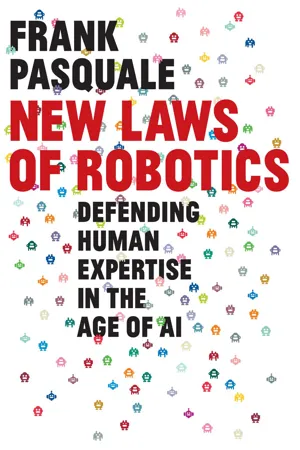
- English
- PDF
- Available on iOS & Android
About this book
"Essential reading for all who have a vested interest in the rise of AI." —Daryl Li, AI & Society
"Thought-provoking…Explores how we can best try to ensure that robots work for us, rather than against us, and proposes a new set of laws to provide a conceptual framework for our thinking on the subject." —Financial Times
"Pasquale calls for a society-wide reengineering of policy, politics, economics, and labor relations to set technology on a more regulated and egalitarian path…Makes a good case for injecting more bureaucracy into our techno-dreams, if we really want to make the world a better place." —Wired
"Pasquale is one of the leading voices on the uneven and often unfair consequences of AI in our society...Every policymaker should read this book and seek his counsel." —Safiya Noble, author of Algorithms of Oppression
Too many CEOs tell a simple story about the future of work: if a machine can do what you do, your job will be automated, and you will be replaced. They envision everyone from doctors to soldiers rendered superfluous by ever-more-powerful AI.
Another story is possible. In virtually every walk of life, robotic systems can make labor more valuable, not less. Frank Pasquale tells the story of nurses, teachers, designers, and others who partner with technologists, rather than meekly serving as data sources for their computerized replacements. This cooperation reveals the kind of technological advance that could bring us all better health care, education, and more, while maintaining meaningful work. These partnerships also show how law and regulation can promote prosperity for all, rather than a zero-sum race of humans against machines.
Policymakers must not allow corporations or engineers alone to answer questions about how far AI should be entrusted to assume tasks once performed by humans, or about the optimal mix of robotic and human interaction. The kind of automation we get—and who benefits from it—will depend on myriad small decisions about how to develop AI. Pasquale proposes ways to democratize that decision-making, rather than centralize it in unaccountable firms. Sober yet optimistic, New Laws of Robotics offers an inspiring vision of technological progress, in which human capacities and expertise are the irreplaceable center of an inclusive economy.
Frequently asked questions
- Essential is ideal for learners and professionals who enjoy exploring a wide range of subjects. Access the Essential Library with 800,000+ trusted titles and best-sellers across business, personal growth, and the humanities. Includes unlimited reading time and Standard Read Aloud voice.
- Complete: Perfect for advanced learners and researchers needing full, unrestricted access. Unlock 1.4M+ books across hundreds of subjects, including academic and specialized titles. The Complete Plan also includes advanced features like Premium Read Aloud and Research Assistant.
Please note we cannot support devices running on iOS 13 and Android 7 or earlier. Learn more about using the app.
Information
Table of contents
- Cover
- Title Page
- Copyright
- Dedication
- Contents
- Epigraph
- 1. Introduction
- 2. Healing Humans
- 3. Beyond Machine Learners
- 4. The Alien Intelligence of Automated Media
- 5. Machines Judging Humans
- 6. Autonomous Forces
- 7. Rethinking the Political Economy of Automation
- 8. Computational Power and Human Wisdom
- Notes
- Acknowledgments
- Index